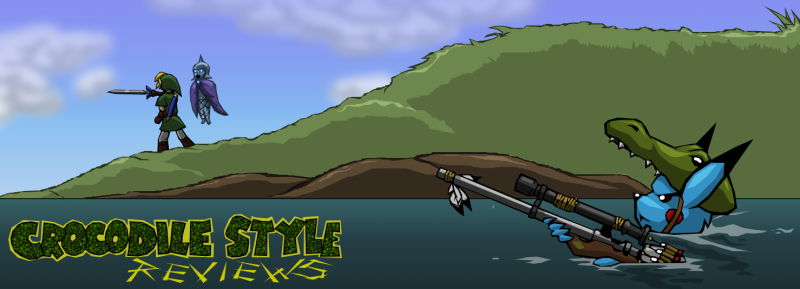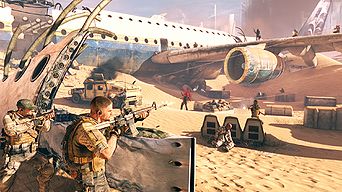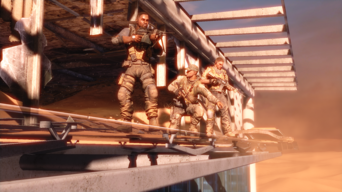The 'Shroom:Issue LXV/Critic Corner
Director's Notes
Gah! Hear me, man? Gah! Small batch and little news this month, but basically Henry Tucayo Clay (talk) is filling in the Book Reviews section again this month, but don't be fooled since he isn't writing this permanently. The section is still vacant if you want to sign up for it.
By suggestion from one Awesome Koopa (talk), I've introduced a brand new section titled Game Comparisons, wherein the writer obviously weighs two games together and looks over the similarities and differences between them. Basically Character Comparisons but for entire games. Again, thank you Awesome Koopa for the suggestion, we really appreciate it.
And don't forget to vote for the sub-team's section of the month conveniently located at the end of this page, our writers (including myself) use votes to measure their worth as human beings. Please don't let them lose faith in themselves! It's up to you to ensure they don't commit ritualistic suicide! You have the power.
Critic Corner Section of the Month
Oh wait section of the month for the July Special Issue last month. Victor was Should Have Been by MrConcreteDonkey (talk) with 28 votes (a whopping %47.46 of the total votes), writing about the beta elements, possible improvements, and the scariness of BIG THINGS in Super Mario 64. Congrats, bro, now if only you had the time to send a section in this month.
Runner-ups were my own section Dippy's Matilda winning 15 votes (%25.42), a Goliath of a section discussing sexism in video games; and Marioverse Reviews from our newest writer marioboy14 (talk) taking 6 votes (%10.17), his debut for the newsletter reviewing each world in Super Mario World one by one. Good work, blokes.
Marioboy14 gets into the Olympics groove with Mario Tennis: Power Tour.
[read more]
Marioverse Reviews
Hello! I'm back with another review! Today, I'm dating back to the times of the Gameboy Advance. I bring you, Mario Tennis: Power Tour!
When I first got the game, I was shocked. Where are all the Mario characters? Only Mario, Luigi, Peach, Bowser, Donkey Kong, and Waluigi? No Daisy, Yoshi, or even Wario? This was a downer... But, let's get to Adventure Mode!
You start out with either Ace or Clay (human characters). Masked players are beating the top contestants at the Academy (the school you attend). The next morning, you can choose the singles path (solo) or the doubles path (play with the default partner). This changes the storyline around the Island Open (I'll get to that later).
After TOO much dialogue, you finally start playing in the Junior Tennis Class. The characters you face are particularly easy, because you just started the game. With players ranging from power, to technique, to all around. The players are weak, the storyline is bad, my rating for this point: 5/10. People, must I remind you, this is only the beginning of the game.
Whew. Thank goodness Junior Class is over. You will progress to the Senior Courts. The players are all missing?! You hit the training place where you learn power shots (interesting little add ins to make the game more fun!) Once you return, you face the players. The storyline gets better because each character you face has their own little story. Kyoko, for example, has a past with everyone beats her. All the characters have emotion. The last character is a challenge Emi, from Varsity Class, has wicked power shots (at that point in the game) and a super good strategy. The characters are great, the challenge is there, this point gets an 8/10.
Varsity Class is your final challenge before the grand Island Open! These characters have descriptive personalities and are much more challenging than any of the characters you have faced before. Their power shots will amaze you at this point, and the storyline gets great! Nintendo finally flicked the light switch here! You go through the ranks, and the best part is, you don't have to challenge the top player! Once you get the ticket to the Island Open, the story gets absolutely amazing. My rating for this point: 8.5/10.
Island Open. The part where every person who ever played the game will tell you, it is the best part. Four schools go head to head in an Olympic Games sort of way (sound familiar?). Academy, Empire, Union, and Factory are all BACK for the title. If you ever played Mario Power Tennis, you'll remember. The story is superb. You battle your way to the championship. The hardest part is, I need to divide it into two sections: Singles and Doubles.
SINGLES: This is fun. You face an Empire Rep. first named Barb. She is a pack of power! Next, Sass is a power player that will knock you off your feet. Elroy (Academy) will verse you. This is an Academy vs Academy for the final two spots. After, you verse Willy from Factory for the championship. Amazing!
DOUBLES: You immediately verse Chas and Mel from Union. They're pretty easy. Dweezil and Mynx are up next, and they get more intense. For the championship, you verse the dynamic duo, Willy and Sheri. It's amazing!
My rating for this point is a 10/10. The story has been changed and perfected, the characters are great, and everything is amazing.
But wait! There's more! You may think you're done at this point, but you're wrong! Now, Mario has called you to play in the Peach Dome Tournament and such. Congratulations! You finished the game! Now you can go back and play again in doubles/singles to have new obstacles and faces!
My overall rating for the game is 31.5/40. That's 79%! I would suggest this game to anyone who wants a good storyline and fun new faces. Thanks for reading! Marioboy14 out!
Crocodile Style Reviews
| Spec Ops: The Line | |||||||||
|---|---|---|---|---|---|---|---|---|---|
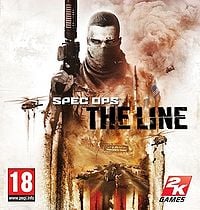
| |||||||||
| Developer | Yager Development | ||||||||
| Publisher | 2K Games | ||||||||
| Platform(s) | PlayStation 3, XBox 360, Windows | ||||||||
| Genres | Tactical third-person shooter | ||||||||
| Rating(s) |
| ||||||||
| Available From | |||||||||
Shooters seem to have a rather bad reputation these days, which one could easily attribute to frothing jealousy that the genre is the most popular and successful in the medium at the moment, but more realistically it's because most of them are shit. Delude yourself with false illusions of good multiplayer all you want, but it can get pretty scary when the two fastest-selling and most well-known franchises of the modern age are trying to paint the vast American population as racist, nationalist fascists dedicated to the utter decimation of any and all foreign nations that look at them funny just to prove to everyone red, white, and blue is still large and in charge, which I guess is just as well since you're all so fat anyway. To that end, thank Christ Spec Ops: The Line exists, because without even joking it will very likely be my top game of the year, and no one is more surprised by that sentence than me.
Spec Ops: The Line is a tactical third-person shooter game based loosely on the Joseph Conrad novel Heart of Darkness, which inevitably means people are going to compare the game to Apocalypse Now another piece of military visual media with a liberal interpretation on the same novel, not that the game has that much to do with either. Set in Dubai six months after it's been ravaged by the worst sandstorms in recorded history, which might be tempting fate in real life just a little, a squadron of American marines stationed in the city called the 33rd Infantry led by one John Konrad… oh, I see what you did there… are trapped in the desert tomb and presumed dead until the U.S. receives a distress signal from them. This coaxes the country to send three gruff U.S. marines to search the ruins of the city, find Konrad and his men, and rescue any survivors, putting you in the shoes of the trio commander Martin Walker. However, shit has hit the fan quite violently beyond their initial expectations as the three find themselves trapped in a multi-faction civil war with no contact to the outside world in a city forcefully taken over under martial law by Konrad and the 33rd Infantry, who are now executing and striking fear into the civilians to control sedition, not unlike actual United States foreign military policy.
Being the jaded bogan I am, I walked into this release expecting another groan-worthy jingoistic American power fantasy whose sole moral message would be along the lines of “kill all the foreigners”, but Spec Ops is one of those pleasant surprises that shine through the rough every so often that give me a jarring reminder for why I waste so much time digging for diamond in a mine consisting primarily of talc and sewage. The game is an interesting insight into the deeper psychological horrors of warfare and the unglamourous consequences that come from it, which is probably why the game does it all it can to make you feel like complete shit for playing it. It was about a quarter of the way through the game when the protagonists accidentally fucked something up big time despite their moralistic self-assurance that I realised the oversimplified black and white morality of most military shooters didn't apply here, a nice deviation from others of its ilk which abide by a strict “we good, they bad, now shoot” policy.
It's a good thing the story hooked me in so well because the gameplay is certainly not much to brag about, not that that's necessarily a bad thing. It's the usual tactical shooter shtick wherein you run towards cover, pop out every few seconds to play gore-spattered Hit the Targets with enemy insurgents, and frequently stare at your watch in a corner while you wait for your health to regenerate. But allow me to be a pretentious git and elaborate that gameplay doesn't necessarily have to be perfect or even traditionally “fun” for it to be truly transcendent, case in point being horror games being designed to terrorise and emotionally traumatise you, and “horror” is certainly a word that describes the swirling torrent of emotional distress that Spec Ops endeavours to put you through.
The characters in this game are certainly not having fun shooting wave after wave of American troops and inadvertently fucking everything up more than before just for the sake of survival and a twisted, selfish sense of justice, as they grow more and more jaded, exhausted, and frustrated with their predicament to the point where each fight scene grows to look the same to them. There's even a noticeable difference in the protagonist's mannerisms as the game progresses, starting out with the usual calm indifference and composure one would expect from a marine before gradually shifting into exhausted shouting, excessive expletives, and aggressive sarcasm to reflect on their growing impatience, distrust in each other, crippling self-doubt, and emotional trauma about the monsters their own hubris and struggle to survive are forcing them to become… bloody hell, maybe this game is a little too good at what it does because just reading that sentence makes me want to hang myself.
Even if the core gameplay works so well with the events of the story, I can still complain about some of the other features surrounding that pleasant gameplay-as-metaphor, and this wouldn't be the section it is if I didn't needlessly nitpick everything. There's not really much to the strategy; your black and white mates can use explosives and sniping gear respectively so their skills can come in handy in situational scenarios, but more often than not they'll just find themselves shot stunned from how long it takes them to get into position, forcing you to put yourself in harm's way just to get them back on their clueless feet. The biggest problem with issuing orders is that they can only take specific commands requiring you to manually aim at who you want them to shoot at, a slow process which more often than not gives you incentive to just shoot the twitchy buggers yourself, so so much for that mechanic.
Presumably just to make the desert theme useful you're occasionally given the option to destroy bits of scenery holding back a torrent of sand to bury large groups of enemies, but these moments are so few and far between that you may as well have just built giant sand castles for how relevant the feature is. There are still achievements for getting a certain number of kills or landing fancy shots, and getting a careful headshot on enemies makes their heads explode and gives you a slow-motion shot of this detonation in action, rewards which seem completely hypocritical from a game otherwise doing a fine job letting you know you're an asshole for enjoying all this murder. Perhaps that's the point, though, to give you visceral bloodshed seemingly without consequence so it proves all the more poignant when that very glee and self-indulgence winds up biting you and the wider populace square in the sphincter.
But those problems can be easily ignored just from the strength of the story alone, although I understand it might sound a bit weird to compliment a game for less-than-brilliant gameplay or for making you feel bad for playing it. But having drowned myself in pathetic glorifications of thoughtless murder over the years it's just so refreshing to play a game that inspires cognitive dissonance in its players and encourages them to actually analyse the consequences and harm likely to come from their reckless behaviour. This gets particularly jarring with Walker himself, placing you as the person controlling him in a very awkward position as his diminishing humanity, frequent hallucinations, and hollow justifications for his increasingly horrific atrocities progressively makes you leerier of his own stability and moral compass, like you are the last thing in his mind keeping him even vaguely connected to the real world. And while I don't want to spoil the ending (or at least the one I chose, since there are multiple endings), I'll just say the game has possibly the greatest reveal I've seen in any work of fiction in a long time.
If I'm not coming off as particularly witty or funny this month, it's because it's just so hard to make jokes when Spec Ops keeps trying to crush me under a wave of emotional torment and despair, although that could just be all the sand. But as a form of horror game this is exactly what's so appealing about Spec Ops, and the overall quality of its story campaign, character archs, and thematic design far surpasses any petty complaint I or anyone else can vomit out. If you're interested in seeing games grow and mature as an artistic medium, then definitely pick up Spec Ops: The Line as soon as you can, since it's about as close as you'll get to an All Quiet on the Western Front for video games at this moment in time and will hopefully serve as a template for future shooters to comport themselves in a less discriminatory fashion. But if yielding to the idea that foreign cultures are people too and that shooting anyone with a different coloured hat than you may not be as glorious as you want to think is too much for you to bear, then you should probably get back to grooming that little moustache of yours, mate.
Dippy's Matilda
Hey everyone, welcome back to Dippy's Matilda! After the monolith of a section I wrote last month, and the fantastic if not cripplingly depressing masterpiece I reviewed this month, I'd like to take a sit back and tackle a subject a little less deep, articulate, and incredibly pretentious. So to that end, here's my take on Immersion! I had originally planned to do this back in May to go with my Journey review, but since I had surgery that month and it was a struggle to even get my review in on time I decided to postpone it until I found another game that was incredibly immersive. Now that I have, I'd actually like to go in a completely different direction from my original intention of this subject and speak about immersion in a general sense rather than using Spec Ops as an example.
Within the contexts of entertainment and arts, the Oxford dictionary defines immersion as “[involving] oneself deeply in a particular activity”, which is fairly straight-forward. We've all felt engrossed in something before, whether it be playing a sport, painting a picture, having a good discussion, or of course, playing a game. If we really love what we're doing, it's very easy to become so engaged in an activity that we can lose awareness of everything else in our lives for an hour or few. The importance of game design that encourages immersion and intrigue in the world the players are going to spend their valuable time on can't be overstated, as there's no point in making a half-assed world that people just can't get invested in, otherwise they're just wasting their time; this sort of devotion and engagement in a setting you've created is what all developers should strive for to make truly amazing games.
A bit of a thorn in this discussion is that like art, immersion is a subjective thing evaluated on a personal level by each individual's own interests and expectations. What one person considers absorbing another could consider phony or a waste of time; I'm sure there are plenty of people who find Kirby more immersive and engaging than, say, Deus Ex. I don't necessarily agree with that assessment, but I couldn't say they're wrong or even lying about how absorbed they are in the experience any more than they could claim I'm in the wrong for finding something like Silent Hill or Beyond Good and Evil more deeply engaging. But too often I think we overlook or forget the things that make a game so absorbing for us, which I guess is somewhat of a good thing for the gamers since they're therefore only focussed on the experience and not the technical aspects surrounding it, but it's a very dangerous thing to forget for devoted game developers.
The most obvious way to get taken in by a game is a slick and fun gameplay experience, which is why story-less NES titles and casual games remain so popular. After all, you could have the greatest story and thematic design in the whole world, but if you fail to have the appropriate gameplay to support those, then what's the point? But that gameplay is not the only way we get taken in by a game, and in fact, solid gameplay could prove meaningless to some of us if we don't have a good, interesting concept backing it up to help it stand above others of its genre, so it's very much a symbiotic relationship. Think back to the point-and-click adventure days when technology was too primitive to deliver a complex story and interactive gameplay experience at the same time, especially those made by LucasArts. Gameplay in titles like Monkey Island or Grim Fandango were virtually non-existent, but did that stop their gorgeous, well-crafted worlds and characters from being immensely popular among gamers?
Now obviously all story no gameplay is not a good way to design video games, as I wrote in my article about cutscenes, and with modern technology we're able to reconcile the two far more efficiently than we could during the point-and-click age. But from these adventure game examples we can see that so many people could find themselves absorbed in a game just from their stories, characters, themes, and humour alone, which certainly proves that all those factors play a big role in immersion. Have you ever played two games with very similar mechanics and gameplay but entirely different concepts (e.g. one is fantasy, one is science fiction), but found you enjoyed one over the other, or even didn't like one of them altogether? This could have to do with subtleties in the gameplay, yeah, but more often than not it's because you prefer the concept of one of these titles over the other, and find you can get immersed more in that particular theme.
Sometimes it's the characters and dialogue that just makes a game for you or it could be the costume and equipment designs, or it could be the detail of the flora and fauna, whatever it may be, there's usually something unrelated to the mechanics in the game's design that makes you more engaged and invested in the world you've decided to become a part of. It's generally easy to tell when the developers themselves were incredibly devoted to the concept and world they were building their game on, and it goes without saying that a game with no love from its own creators is going to turn out completely heartless or catastrophically terrible. Without an interesting concept that can get people attached and taken in by the game, developers are not going to be invested in the project, which leads to a distinct lack of care put into the game which then leads to an unimmersive, lifeless experience for the players, and that is certainly not what the end result of a game should be.
But one doesn't necessarily have to play a game directly to feel absorbed in it. No one will argue that the experiences you have from watching someone else play a game, and playing it yourself, are two vastly different things, but neither is inherently better or worse than the other. We've all done it before, just watched a relative or friends play a game while trying to follow the story and asking questions about the gameplay. This is why Let's Play is so popular, because sometimes we want to engage ourselves in someone elses experience, witness the game through their eyes and see what they got out of the game. For example I've not been able to play the Uncharted games due to money problems, but through watching LPs of them I have not only found a means to get interested and absorbed in the games, but simultaneously become involved in the LPers own unique perspective on them.
Or for a less personal example, take a look at the Dangan Ronpa trend in this very community; almost no one here has actually played the game, but have become so deeply involved in it just through a simple text LP on Something Awful. Are they wrong for getting immersed through someone elses playthrough? Certainly not, it's just another means through which a game can captivate us. This can also be good for education purposes in case you don't have efficient means to otherwise keep up with modern releases, but that's an entirely different discussion. Now this certainly isn't an invitation for all game developers to just cheat their way out of design by filling it with cutscene after cutscene, which would be completely missing the point of the medium; it's up to the individual how they want to immerse themselves in the game, and forcing them to sit down and watch is not an appropriate way of doing so.
I was sure there was more to this topic I wanted to discuss, but if there was I'm having a hard time remembering any of it. I know a lot of this might seem obvious or perhaps even a little pretentious, but I needed a month to relax and talk about something short and simple, so I hope you enjoyed this little recreation article as well. I'll be back to something a bit more contemplative next month, so hope you stick around for then! Thanks for reading, and have a bonza month.
Book Reviews
| The House of the Spirits | |
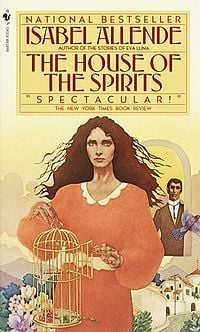 |
|
| Full title: | The House of the Spirits (La Casa de los Espíritus) |
| Author: | Isabel ALlende |
| Released: | 1982 |
| Pages: | 448 |
| Buy: | *Amazon |
HI, readers! I'm your literate Statistics Manager, Tucayo, and welcome to another installment of Book Reviews! I'm just filling in, so if you want to be our book reviewer, please contact Crocodile Dippy (talk)
Last month I took a look at a rather-obscure Swiss book, this time I'll be looking at one the first book of the most important Latin American writers, Isabel Allende's The House of the Spirits. You may have heard there is a film adaptation with Antonio Banderas and Meryl Streep. Well, the film's ending is different from the book's, so having watched the film is no excuse not to read the book.
The recurring themes in The House of the Spirits are magical-realism, slavery, love and political oppression; themes that more-than-often appear in Allende's books. In many Latin American books, actually. Maybe magical-realism is not your thing, but this book is a great way to get into it. It has been often compared to A Hundred Years of Solitude They are indeed similar, but that doesn't mean they both don't deserve to be read, they are both great books.
Now, let's take look at the plot, because that's what good reviewers do, right? Allende takes us to a small Chilean town sometime during the 20th century. The story revolves around the Del Valle/Trueba family, one of the richest and most important families, politically speaking. Through three generations of this family, the history of Chile unravels and we get to see how Esteban Trueba (the main character) sees his world change a handful of times, most of them courtesy of his peculiar wife, Clara; and his daughter, Blanca.
The book gets off to a slow start. Beautiful, yes. But slow. Allende describes things in a way that can't be described with a word other than beautiful. Landscapes and characters are so well developed, that you can really picture what you are reading. That said, if you like fast-paced books, you'll have to wait for the last 100 pages, that's where things get the most interesting. Back to the characters, they are so well developed and so well described, that you almost start to know how each character will react. Even minor characters are important and well-developed, there are almost no fill-in characters that have no reason to be.
Summing up, even if this is not your type of book, it's a quite enjoyable read, but some narrator changes can become annoying, and after a while you start to wish there was more action. However, there is one thing I can guarantee; if you like this book, you'll certainly want to read more of her books, and if you want to read more of her books, I recommend the Memories from the Eagle and Jaguar trilogy.
<polldaddy pollid="6473385"></polldaddy>
